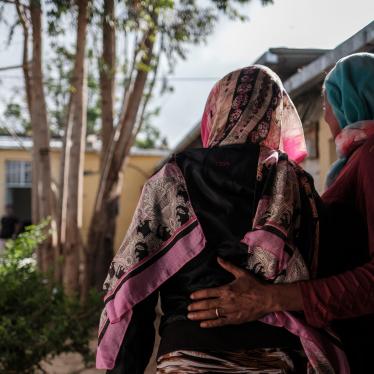(Nairobi) - Women throughout Kenya lose their homes, land, and other property due to discriminatory laws and customs, Human Rights Watch said in a new report released today. Human Rights Watch said property rights abuses in sub-Saharan Africa perpetuate women's inequality, doom development efforts, and undermine the fight against HIV/AIDS.
"Women's property rights violations are not only discriminatory, they may also prove deadly," said LaShawn R. Jefferson, executive director of the Women's Rights Division of Human Rights Watch. "In Kenya and other sub-Saharan African countries, women are exposed to poverty, homelessness, violence and disease - including HIV/AIDS - when their property rights are abused."
The 51-page report, Double Standards: Women's Property Rights Violations in Kenya, examines the devastating impact of women's property rights violations in Kenya, where the constitution condones discrimination in property matters.
Human Rights Watch found:
- Women are often excluded from inheriting property, evicted from their lands and homes by in-laws, and stripped of their possessions.
- Some widows are forced to engage in risky sexual practices that can expose them to AIDS in order to keep their property, such as "wife inheritance," where women are inherited by male in-laws, and ritual "cleansing," where women are forced to have sex with men of low social standing.
- Divorced or separated women are frequently expelled from their homes with only their clothing.
- Married women can seldom stop their husbands from selling family property.
- Women who fight back are often beaten, raped or ostracized.
- These violations and their impact are magnified by Kenya's high HIV/AIDS prevalence. HIV-positive women, already harmed by stigma and discrimination, are gravely threatened by property rights violations. Women's insecure property rights also hinder development by contributing to low agricultural production, food shortages, underemployment, and rural poverty.
Human Rights Watch said that with a new government in office, movement toward a new constitution, and an upsurge in donor support, now is a pivotal time to improve women's property rights.
"For decades, the Kenyan government has ignored the crisis of women's unequal property rights," said Jefferson. "Kenya and donor agencies now have a historic opportunity to make property rights a reality for women."
The Kenyan government has said it will hold debates on a new constitution in the first half of 2003. The proposed draft constitution, if implemented, would drastically improve women's property rights, including guarantees of equal rights to inherit and control property and prohibitions on customs and traditions that undermine women's dignity or status.
Human Rights Watch called on the Kenyan government to institute legal reforms, implement programs to prevent and redress property rights abuses, and punish those who violate women's property rights. Human Rights Watch also said the World Bank and other donors should use aid to eliminate women's property rights violations.
Voices of Kenyan Women Featured in "Double Standards"
(Pseudonyms are used for the women mentioned below to protect privacy)
Emily Owino, a fifty-four-year-old widow from western Kenya, said that shortly after her husband died, her in-laws grabbed her farm equipment, livestock, household goods, and clothing. The in-laws insisted that she be "cleansed" by having sex with a social outcast, a custom in that region, as a condition of staying in her home. They paid a herdsman to have sex with Owino, against her will and without a condom. Her in-laws later took over her farmland. She sought help from the local elder and chief, who did nothing. Her in-laws forced her out of her home, and she and her children became homeless. No longer able to afford school fees, her children dropped out of school.
A mother of eight children, Mary Abudo's violent husband separated from her and kept all of their property in Kisumu, including vehicles, land, and furniture. She got nothing. Abudo went to live with her mother, but her relatives forced her out when her mother died because they thought a daughter should not inherit. "I became homeless," she said. "My relatives set upon me and beat me viciously. I was afraid I'd die."
When Susan Wagitangu's parents died, her brothers inherited the family land. "My sister and I didn't inherit," said Wagitangu, a fifty-three-year-old Kikuyu woman. "Traditionally, in my culture, once a woman gets married, she does not inherit from her father. The assumption is that once a woman gets married she will be given land where she got married." This was not the case for Wagitangu. When her husband died, her brothers-in-law forced her off that homestead and took her cows. Wagitangu now lives in a Nairobi slum. "Nairobi has advantages," she said. "If I don't have food, I can scavenge in the garbage dump."





